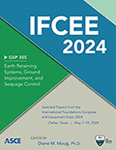Experimental Study on Grouting Injectivity of Artificial Rock Joints at High Temperature
Publication: IFCEE 2024
ABSTRACT
The demand for the construction of geological disposal facilities has increased owing to the dearth of sustainable solutions for high-level nuclear waste management. Nuclear waste should be disposed of in deep underground spaces for long-term isolation to prevent radioactivity and overheating hazards. Several microcracks of various sizes exist in deep rock masses. These microcracks cause the inflow of groundwater and outflow of radionuclides, which can hinder the mechanical stability of the disposal facility. Therefore, cracks adjacent to storage spaces must be filled using grouting techniques. At the repository depth (500–1,000 m), the temperature exceeds 60°C owing to the thermal effect arising from radioactive waste and geothermal heat. The properties of cement grouts are affected by temperature and the water–cement ratio. In addition, the performance of cement grout is time dependent, and its viscosity varies with temperature. Considering grouting activities at high ground temperatures (e.g., 60°C), the mechanical and rheological properties (viscosity and yield strength) of grout in high-temperature environments should be investigated. In general, when grouting is performed at high temperatures, injectivity decreases owing to an increase in the viscosity and yield strength of the grouting material. In this study, laboratory experiments are conducted using micro-cement as the grout material to measure the viscosity and yield strength based on the temperature, mixing ratio, and injection time. Furthermore, artificial specimens with joint apertures of less than 1 mm are prepared for grout injection experiments. The injected distance based on different temperatures, mixing ratios, and injection times is analyzed. The injection performance of grout materials is evaluated under different temperatures (20°C–60°C). The injection characteristics are analyzed based on the relationship between the rheological properties and injectivity. Test results show that the viscosity and yield strength of the grout materials increase with temperature, thus resulting in a decrease in injectivity. The findings of this study can provide valuable input parameters for numerical simulations and basic data for in situ grouting operations at high temperatures.
Get full access to this chapter
View all available purchase options and get full access to this chapter.
REFERENCES
Bohloli, B., Morgan, E. K., Grøv, E., Skjølsvold, O., and Hognestad, H. O. (2018). “Strength and filtration stability of cement grouts at room and true tunnelling temperatures.” Tunnelling and Underground Space Technology. 71, 193–200.
Gustafson, G., Claesson, J., and Fransson, Å. (2013). “Steering parameters for rock grouting.” Journal of Applied Mathematics. 2013.
Kim, J., and Lee, E. K. (2022). “A fundamental study on the criteria of basic parameters for planning rock grouting.” Journal of the Korean Geotechnical Society, 38(2), 15–27.
Lee, H. B., Oh, T. M., Park, E. S., Lee, J. W., and Kim, H. M. (2017). “Factors affecting waterproof efficiency of grouting in single rock fracture.” Geomechanics & engineering. 12(5), 771–783.
Lee, J. W., Kim, J. Y., Weon, J. H., and Oh, T. M. (2022). “Time-dependent characteristics of viscous fluid for rock grouting.” Journal of Korean Tunnelling and Underground Space Association. 24(6), 465–481.
Lee, J. W., Oh, T. M., Kim, H., and Kim, M. K. (2019). “Coupling material characteristics with water–cement ratio for elastic wave based monitoring of underground structure.” Tunnelling and Underground Space Technology. 84, 129–141.
Lee, J. W., Weon, J. H., Choi, H. Y., and Oh, T. M. (2021). “Analysis of viscosity and bleeding characteristics of grouting materials according to the proportion of bentonite.” LHI Journal of Land, Housing, and Urban Affairs. 12(4), 127–137.
Mirza, J., Saleh, K., Langevin, M. A., Mirza, S., Bhutta, M. A. R., and Tahir, M. M. (2013). “Properties of microfine cement grouts at 4 ℃, 10 ℃ and 20 ℃.” Construction and Building Materials. 47, 1145–1153.
Wang, M., Zhu, Z., Liu, R., Li, S., Zhang, C., Liu, Y., Zhang, L., and Bai, J. (2021). “Influence of extreme high-temperature environment and hydration time on the rheology of cement slurry.” Construction and Building Materials, 295, 123684.
Information & Authors
Information
Published In
History
Published online: May 3, 2024
ASCE Technical Topics:
- Chemical wastes
- Construction engineering
- Construction methods
- Continuum mechanics
- Cracking
- Engineering fundamentals
- Engineering mechanics
- Environmental engineering
- Fluid mechanics
- Fracture mechanics
- Grouting
- Hydrologic engineering
- Joints
- Material mechanics
- Material properties
- Materials engineering
- Measurement (by type)
- Pollutants
- Radioactive wastes
- Solid mechanics
- Strength of materials
- Structural engineering
- Structural members
- Structural systems
- Temperature effects
- Temperature measurement
- Viscosity
- Wastes
- Water and water resources
Authors
Metrics & Citations
Metrics
Citations
Download citation
If you have the appropriate software installed, you can download article citation data to the citation manager of your choice. Simply select your manager software from the list below and click Download.
